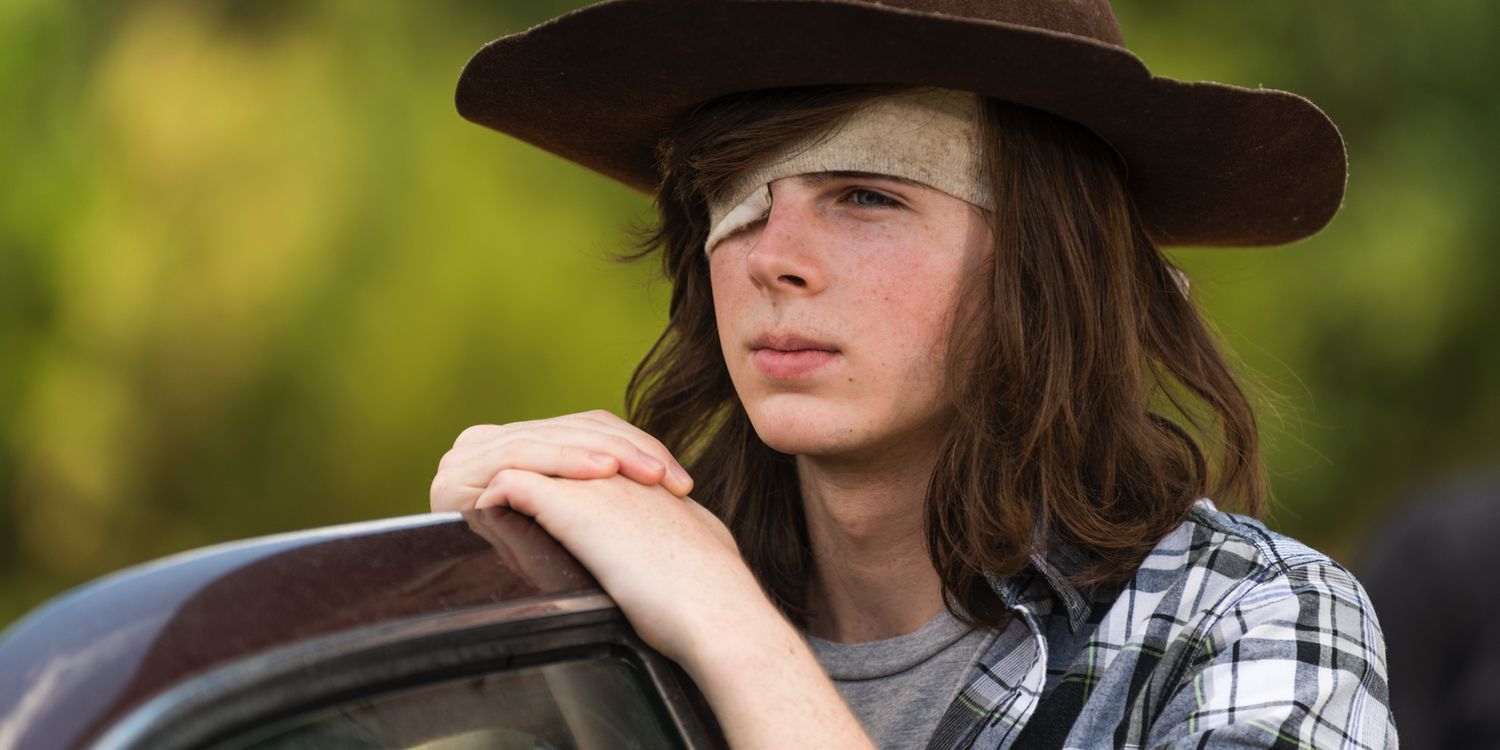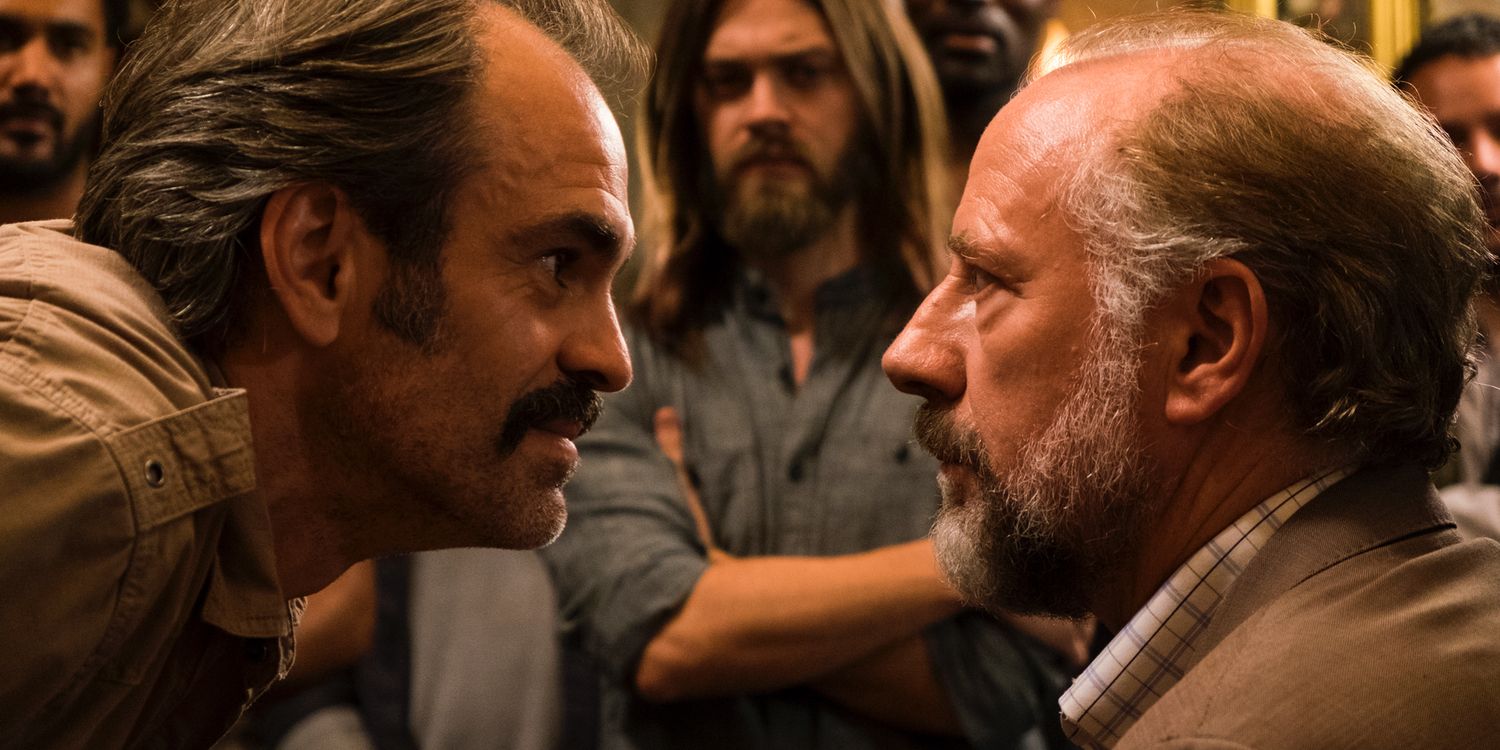For what could be argued is the first time in the series' long run, the idea of community has become much more tangible than ever before. The Walking Dead has set up shelters and safe-havens before, but with the exception of, say, the tiny township overseen by the Governor there hasn't really been an example of people coming together in large numbers to do more simply survive. But doing so is key not only to the characters' longevity but also the series itself. After six seasons and some change, The Walking Dead can't just be about people running from place to place, stabbing zombies in the head and dispatching the inevitable despotic individual who has risen to power in the immense vacuum created by the zombie apocalypse. Like its characters, the series has to grow out of its fascination with merely surviving; it has to become about the pursuit to rebuild a broken world, to find out if it is truly beyond repair or if there is still something worth saving.
While the show seems reluctant at times to really explore that notion, especially when it dedicates an unnecessarily long episode to underlining what the audience already knows: that the big bad bully with a baseball bat fetish is a big bad bully with a baseball bat fetish. Still, there is increasing evidence that the ongoing adventures of Rick and Co. has no other choice but to shift its attention to something larger than itself. So far in season 7 the most compelling evidence of this was the second episode's shift away from a nihilistic fetishizing of heads pounded into goo towards the introduction and exploration of Ezekiel – a sane man with who knows the importance of appearing the opposite.
That shift had more to offer than a kooky new character with a big cat, or the continuation of Carol and Morgan's storylines. It demonstrated that, if it wanted to, The Walking Dead could use its increasingly disparate locales to further a more positive narrative. And sure, things are probably going to get worse before they get better – though asking how much worse things can get on The Walking Dead might be moot at this point – but what's important for the moment is the availability of those disparate locales.
That's where Hilltop community comes in with 'Go Getters'. It is another Walking Dead version of a palate cleanser in the wake of spending time with Negan. But with the trip to The Kingdom already in the rearview, shifting the focus to Gregory, Jesus, and Maggie helps paint a more interesting picture of just how dissimilar these various communities are, primarily through the individual they have chosen as their leader. In that sense, there is also a layer of commonality between The Kingdom, Alexandria, and Hilltop: desperation.
While Rick has shifted to trembling enfeeblement with just a hint of seething rage, and Ezekiel presents himself as an odd voice of reason in a volatile situation, Gregory has become the living embodiment of that shared sense of desperation. Xander Berkeley's performance as a callow leader is one of the more enjoyable aspects of the hour. Burdened by his frustrations at being subjugated by the Saviors, and in Alexandria's inability to neutralize the aggressors, as was their lofty claim, Berkeley makes for a pitiable villain. He also creates a potentially interesting conflict that goes beyond Negan versus the expanded world of The Walking Dead. There is a conflict brewing that hints at Gregory's unsuitability as a leader and the woman who would make for an obvious successor. It's the sort of shift that, when boxed up in an episode like 'Go Getters' – that jumps around between characters and locations more than any other episode so far this season – is welcome, as it affords the hour a different kind of tension.
It's important to note that only some of 'Go Getters' benefits from that altered tension. There is a sort of fascinating ascension in the works with regard to Maggie, and whether she knows it or not, her greatest obstacle at the moment isn't Negan or even Gregory, but being aware her own skills as a leader. Given that so much of the season so far has been focused on the people running various communities and how the way in which they govern describes that community's state of mind, there is a sense that things in Hilltop will get better once Jesus, Maggie, and Sasha have deposed Gregory and installed him as a puppet leader do avoid further reprisals from the Saviors.
That creates a potentially interesting dynamic that, in some small way, progresses the notion of pending war. It's a surreptitious act of aggression on the part of the Hilltop community against the Saviors, and after the arrival of Simon (Steve Ogg), it could not have come at a better time. That's not because Simon is doing his best rendition of Negan during his visit to Hilltop, or that, in an effort to instill a little fear into the oddly unpopulated colony (the budget must have been tight after last week's superfluously super-sized episode), the Saviors send a car playing loud music crashing through the front gates, attracting walkers that Jesus has to jump kick into oblivion. No, it's because war with the Saviors means the show is one step closer to removing a group of villains that have already ceased to be interesting.
The Walking Dead has shown the Saviors' routine so many times its beyond redundant. As a group of adversaries, they don't have any other moves; there's very little that's appealing or interesting about them as villains beyond their leader's willingness to kill well-liked characters from the show. At this point, the show has written the Saviors as an unstoppable force, capable of doing anything to anyone. That flies in the face of Rick's group swiftly dispatching a cluster of Saviors without breaking a sweat in season 6, but as is the way of this show – everyone is as competent or incompetent as the story needs them to be in the exact moment one or the other becomes narratively necessary.
So despite watching Simon be an entertaining Negan-lite, he doesn't really offer the audience anything that hasn't been seen before. For all his menace-behind-a-smile presence, Simon is another example of the show spinning its wheels until the time comes for Negan to kill another member of the cast, and for those oppressed by him decide to rise up. To that end, 'Go Getters' gives the impression that things are finally going somewhere, thanks in large part to Jesus and Carl actually, uh, going somewhere. It's good to see the show putting someone competent like Jesus on Negan's trail, and the addition of Carl as a stowaway generates stakes that Jesus on his own wouldn't.
There is a lot of animosity building toward Negan and that can only spur the sort of change and progression The Walking Dead needs right now. The show has spent weeks since the grim premiere offering essentially the same story over and over again in an attempt to build up the Saviors as an all-powerful force. Now Carl, Sasha, and Rosita are all planning on taking a shot at the king. It's unlikely any will succeed in their endeavor, but the fact that the show has characters actively looking make a change makes a huge difference.
-
The Walking Dead continues next Sunday with 'Swear' @9pm on AMC.



